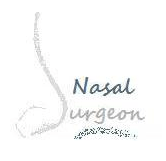Nasal surgery can usually be performed either as a day-case procedure or with an overnight stay. If you undergo septal surgery, rhinoplasty or sinus surgery you may have a dressing or pack in your nose to control bleeding.
This will not need to be removed after surgery as in all cases I use modern dissolvable dressings only.
You will normally be discharged from hospital with a 2 week supply of a sinus rinse / douching system. This helps to clear your nose, dissolve the dressings and prevent infection.
It is expected after most nasal operations that the nasal lining will swell like with a bad cold and this may take several weeks to settle fully but is usually manageable within a few days of surgery.
After sinus surgery including balloon sinuplasty (especially for severe sinus disease and extensive polyps) your nose may become quite productive of mucus.
Use of saline douching such as Neil Med will again help clear this.
An alternative to the saline mix sachets from NeilMed (which are available from Boots, Amazon etc) is the following recipe which uses shop bought ingredients and is very similar.
1/2 teaspoon of sea salt
1/2 teaspoon of bicarbonate of soda
In 1/2 pint of previously boiled tap water.
These quantities are ideal if filling a NeilMed bottle (240 ml volume).
Most patients are admitted to hospital in the late afternoon and have surgery in the evening with discharge after breakfast the next morning.
In rhinoplasty surgery, bruising around the eyes is common and also variable in extent. Arnica tablets and /or ointment may help reduce but not avoid this.
You will have a splint applied to your nose which is normally removed around ten days after surgery.
If you have external stitches at the tip of the nose these will normally be removed around five days after surgery.
For all operations, the main complication which is observed only occasionally is infection. This is generally avoided or minimised by meticulous surgical technique in combination with intravenous antibiotics at time of surgery. Where necessary, you will be given an additional one week course of tablet antibiotics.
If you are in any doubt if you are suffering from a postoperative infection or other problem please contact me directly and I will advise further and where necessary liaise with you and your G.P.
